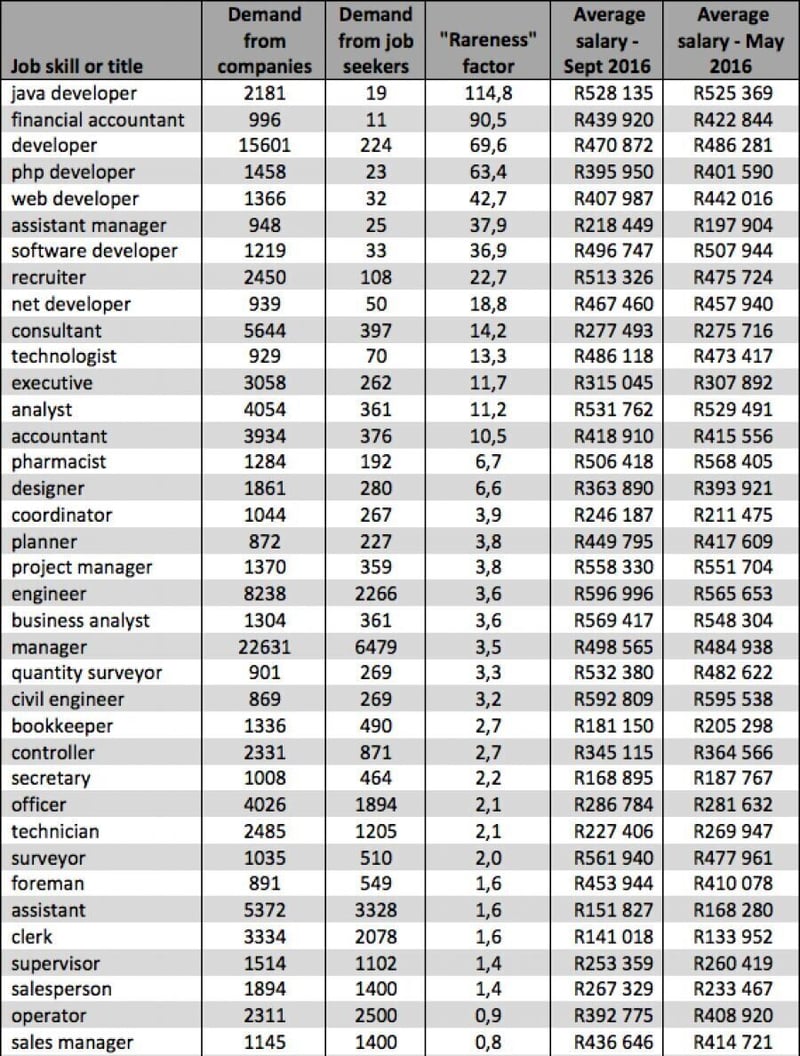
While some jobs are in high demand, others are very hard to find as well. Adzuna in South Africa has done some research on the most sought after skills by companies and their demand from job seekers, crowning those that push both factors the most to be the rarest skills in the country. By this logic, if a skill is in high demand but low in supply, this makes it rarer than skills which are low in both available candidates and low in demand.
From the data generated by listing over 130,000 online job listings in South Africa, as well as searching through mountains of search requests by millions of applicants, skills needed for the following industries and vacancies has risen and is high (see Table 1). However, cross-referenced is the amount of job seekers available or looking for the relevant skills, making some qualifications and skills far more rare to find.
Table 1: Demand for skills by companies crossed with demand for positions by job seeker searches (see image attached above)
A 2,0 factor score would thus mean that in essence, twice as many vacancies exist as job seekers searching for such a position. If this does not seem rare enough already, bear in mind that the job seeker looking for work in that skill or job title may not even be qualified or suitable for the position.
The results contain a few interesting findings, yet the rarest skills still remain in the technology sector. Engineers and developers, together with financial skills, are clearly the hardest to find, with the most demand from firms, yet with the least available candidates. Interestingly, recruiters are now a hot skill, with many organisations and agencies requiring recruitment specialists in their HR departments.
Jesse Green, country manager for Adzuna South Africa commented on the findings: “While not every job in demand is posted online, the trends shown by the sample data are clear and meaningful. Companies must dig deep to explore new ways of attracting programming and engineering skills, as well as some of those in the financial or accountancy area. Management skills too, represent a challenge.”
Combining these two data sets gives one a clearer view on which skills are hardest to find in South Africa, yet not every rare skill is necessarily highly paid.
As a third factor, salary would probably be able to assist in predicting further the rarest skills in South Africa, although in some industries, such as textiles, weaving managers with many qualifications and years of experience do not necessarily earn as high a income as one might imagine, given that there are extremely few of these skills in the country. The highest salaries for those skills in the Table 1 above were for engineers, pharmacists, project managers, developers and analysts.
“What is interesting to note, which is not shown in these results, is the change in salaries from May to September, where the rarer skills have not seen as much growth as one would have expected,” says Green.
Another means of interpreting skill rarity is to see what the Department of Labour recognises as South Africa’s “critical skills”. A list of critical skills is published annually and the list from 2014 is used by the Department of Home Affairs to determine if a foreign worker may be employed ahead of a South African. Green, who has a background in immigration services, mentions that unfortunately this list is becoming outdated and does not take into account later lists published by the Department of Labour.
With numerous means of finding out which skills are rare, the technology arena continually shines through as the place to be working in. Now, with finance skills showing an increasing difficulty to recruit, it will be interesting to see how companies, and hopefully the South African government, ensure that South African firms are able to hire the right people with the best competencies.
Get new press articles by email
7 Press Release Articles
--
Latest from
- Digital skills in more demand in South Africa
- How the increase in average wages can stall the interest rate’s current decline
- Should you add a salary to your job adverts?
- Adzuna Graduate of the Year 2016
- Developers and engineers most needed in South Africa
- Joburg offers four times as many jobs as Pretoria, Cape Town second.
The Pulse Latest Articles
- Education Is The Frontline Of Inequality, Business Must Show Up (December 11, 2025)
- When The Purple Profile Pictures Fade, The Real Work Begins (December 11, 2025)
- Dear Santa, Please Skip The Socks This Year (December 10, 2025)
- Brandtech+ Has 100 Global Creative Roles For South African Talent (December 9, 2025)
- The Woman Behind Bertie: Michelle’s Journey To Cape Town’s Beloved Mobile Café (December 9, 2025)
